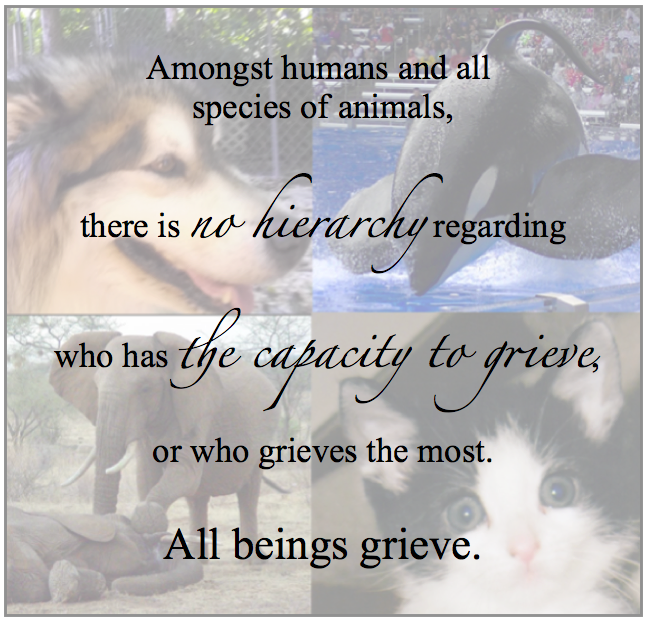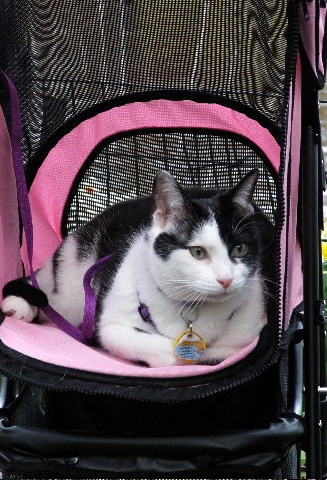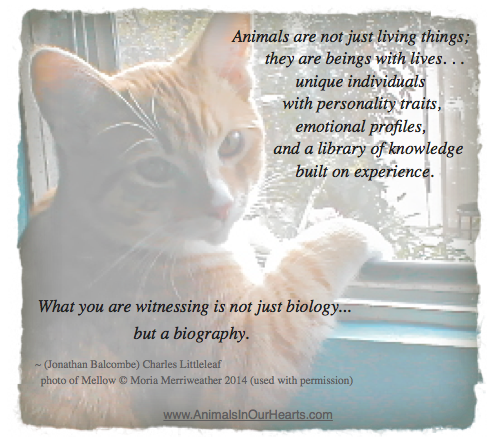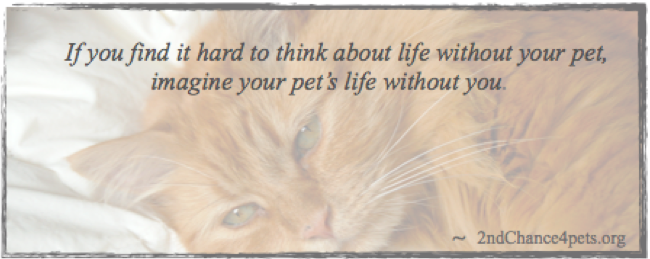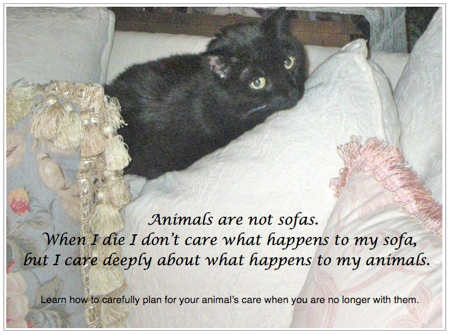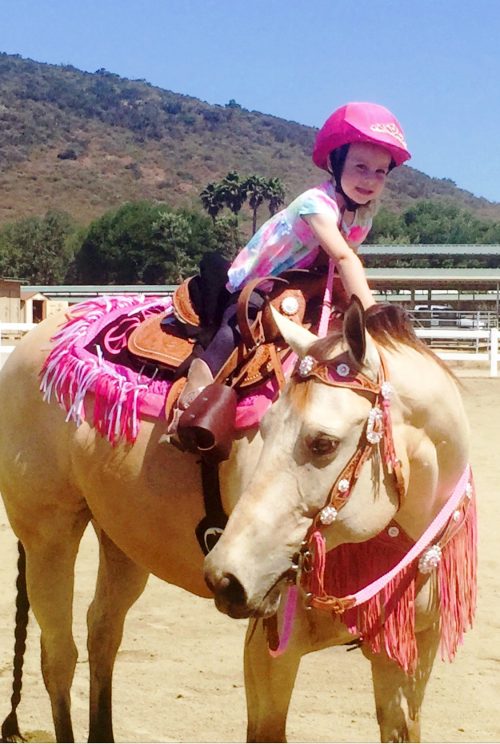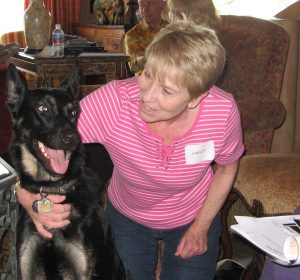Class Details
- Length: 2 sessions, 5 hours
- Class Format: On-demand teleclass to take anytime, at your convenience. You will receive links to 5 hours of MP3 recordings (from a live class which includes the questions, comments and interactions of the participants with the instructor) and PDF’s containing 71 pages of detailed handouts.
- Tuition: $125
- Instructor: Teresa Wagner, MS, Program Founder
- Who Should Attend: For anyone who loves animals, including practitioners who work with animals (such as veterinary professionals, pet loss grief counselors, animal communicators and all animal care professionals) and those who are guardians to animals, and want to better understand how animals grieve and to be well prepared to help animals with their grief and grief-related stress or trauma, and to plan for companion animals’ care when their guardian can no longer do so.
- Register: Click here to purchase (This link will automatically redirect you to the Animals in our Hearts web site for purchase.)
- Testimonials: Click here
For students enrolled in the certification program: - This is an elective class
- Prerequisite: None
- Required Reading: Love Saves the Day, Gwen Cooper
- Fee for Coaching & Mentoring session after submission of Written Class Review: $198 (fee not applicable for students who have pre-paid the entire certification program fee)
Objectives
In this class you will have an opportunity to:
- Explore the differences between viewing animals through a biocentric lens versus an anthropocentric lens, and the impact each has on animals receiving support for their grief
- Become familiar with how both scientific and new age myths about animals not experiencing grief contribute to the suffering of animals
- Increase your understanding of how animals each grieve differently and uniquely—just as humans do
- Identify common circumstances that often trigger grief and grief related stress for animals
- Become familiar with dozens of true stories of animals who have experienced grieving—from elephants, whales, dolphins, chimpanzees, cows, and goats to dogs, cats, birds and horses living with humans
- Examine specific ways in which you can anticipate and prevent potential grief and grief-related stress and trauma for animals
- Learn specific ways to help animals cope with and heal through loss to help mitigate their stress and emotional pain from grief and rehoming when they have lost their human and/or animal families, friends or their home
- Identify the most common mistakes people make regarding their animal’s care in the event of their death or incapacitation, and specific ways to avoid making those mistakes
- Learn how to make plans to insure that the animals you love will continue to be loved and cared for, receiving the physical guardianship, financial support and emotional support you want them to have in the event of your death or incapacitation
- Learn how to send love, calming and peaceful healing energy to any animal who is grieving or in distress, in any location, at any time
Content and Purpose
When I began my professional animal communication practice in 1991, I learned two things fairly quickly: That animals experience the same emotional range as humans, and that they are each unique in the way they experience and express their emotions—just like humans.
Anthropologists and scientists at times concede that some animals might grieve given observed behaviors, but there must be research to “prove” it. They seem reluctant to acknowledge that anything that cannot be proven in physically measurable terms can’t possibly be real, and that somehow only animals with brains the size of human brains or larger may have much emotional capacity. On the other end of the continuum, in new age literature and teachings, erroneous myths and assumptions abound that animals either don’t feel grief because “they all live in the moment and do not hold onto any emotions,” or they get over it quickly, based on theories that animals are “more evolved” than humans and so they do not experience any emotional suffering. Neither of these positions—scientific or new age— is aligned with what I’ve heard from thousands of animals over the years who have grieved deeply when abandoned or lost loved ones. More importantly, neither of these positions serve the animals who suffer loss, trauma and grief because both tell a story that most, if not all, animals don’t even experience grief.
The idea that animals do not grieve or suffer from loss is typically circulated by people who don’t communicate with animals, or who believe that animals are “lesser beings” than humans. When we do talk with animals, having full, interactive conversations with those who have experienced loss, carefully listening to their stories and being open to fully witness their pain, it is abundantly clear that they grieve. Sometimes their grief is so obvious from observation alone that only a closed-hearted, closed-minded person who believes only what science can measure would deny that the animal’s grief is real. There is no hierarchy amongst species regarding who grieves. All beings grieve. To know this, we must acknowledge that some truths in the world are perceived and felt by the heart, not by the intellectual mind or by scientific proof.
In this class we’ll discuss dozens of true stories of animals who have experienced grieving—from elephants, whales, dolphins, chimpanzees and snakes in the wild to dogs, cats, birds, horses, cows and goats living with humans. We’ll review specific ways to support animals who are grieving, whether it’s helping your own companion animals through the loss of a family member (animal or human), helping your adopted rescue animals cope and heal from their losses and grief from their past, wild animals grieving the loss of loved ones from natural death, natural disasters, intentional human killing or from being kidnapped and forced to live in captivity. We’ll discuss ways in which we can anticipate and plan for potential grief and grief-related stress of our animal companions to help mitigate their stress and emotional pain. We’ll also review ways in which we can help wild animals who are grieving even without being anywhere close to their physical location.
You might also be interested in the related class Animals Perspectives and Stories about Death, The Other Side and Coming Back.
Session 1:
Acknowledging and understanding that animals grieve just as we do and
How we can help them through loss, grief, re-homing and starting over
- Myths about if and how animals grieve
- Viewing animals through the lens of biocentrism versus anthropocentrism
- Understanding that animals are individuals and they each grieve differently and uniquely
- List of stories of how animals grieve and your reactions
- Reflecting on your stories about animals grieving
- Thirteen true stories of when animals grieve
- Discussion of the book Love Saves the Day
- Consider all that has changed in the life of an animal whose person or beloved animal has died, or who has been abandoned
- Acknowledge their loss and the possibility of grief or trauma
- Observe, be alert, be aware of their behavior, physical health, moods, attitudes and needs
- Provide tender gestures of reassurance from the heart, hands, eyes and voice when animals grieve
- Offer flower essences for grief (and trauma as needed)
- Learn how to send calming and healing energy to any animal, in any location, at any time
- Listen, listen, listen with empathy
Session 2:
Leaving a legacy of both physical guardianship and emotional support for your animals’ care to prevent grief, grief-related stress and trauma
- Anticipate the potential changes in animal companions’ lives that may cause grief and grief-related stress, and plan ways to prevent, minimize and/or alleviate any suffering
- How to leave a legacy of support for your animals’ care if you predecease them or are no longer able to care for them
- Biggest mistakes people make regarding their animals’ care for after their death or when incapacitated
- FORM: What Do I Want for My Animal Loved Ones If I Die Before Them or Become Incapacitated? and Can No Longer Be Their Guardian
- Physical Guardianship
- Considerations in choosing the best person(s) or organization as guardian for your animal
- Provide detailed information of your pet’s history, important care providers, and daily routine so a new guardian can care for your pet as you would
- FORM: My Pet’s History and Important Health and Care Information
- Financial Support
- For food, healthcare, pet sitting/boarding, dog walkers, groomers, training and other expenses
- Emotional Support When Animals Grieve
- Emotional needs and issues
- What Emotional support do I want my animal to receive?
- FORM: Profile of My Pet’s Personality, Behavior and Routines
Testimonials
EVERYONE who cares for an animal should take this class!!
This was a very comprehensive, extremely thorough and detailed class covering the many varied ways and situations where animals do indeed suffer and grieve. Teresa’s always exemplary organization, range of experience, discernments, biocentric perspectives, and deep thought that she put into the topic made this class MORE than worth taking. Despite already having become quite familiar with much of the content through my own path and experience, having it all handily researched and grouped together in her extensive and beautifully presented handouts created an invaluable wealth of information and brilliant tools to keep on hand and work through! Class participation was also helpful and informative.
As ever, Teresa’s soothing voice and gentle guidance throughout helps ease you through most unsettling emotions evoked from the material. I admire, respect and love Teresa and her works SO very much! EVERYONE who cares for an animal, or is asked to be a possible, future guardian, should take this class!! I can’t say enough about Teresa and her classes, She always frames things so eloquently and gently, is highly organized, is a fellow deep thinker, is very compassionate, has excellent timing, and delivers such superb value in her classes!
The handouts were excellently done, beautifully illustrated, and most of the quotes/posters used were outstanding and on point!
~ Debra H, Okotoks, Alberta, Canada
Great class!
Topics were interesting and informative. Handouts are great to have for reference and as worksheets. Lots of links to additional resources. I was glad to see that rehoming was included as well as fostering. My most significant learning from the class is that animals are individuals and grief will manifest differently for each of them. Always great to learn from Teresa’s extensive background and experience.
~ Robin S, Northridge, California
Sending love and calm extremely valuable
The group exercise on sending love and calm was extremely valuable. I tried sending love and calm to shelter dogs today and did feel that it helped them. There was a noticeable difference in temperament from shaking and very shy to relaxed and happy. It works! Thank you so much.
~ Kelly S, Manchester, Massachusetts
I received valuable guidance
It was a simple reminder that all living things have a cause and effect relation in our lives and all living things have a right to their preferences regarding their life and choices. I received valuable guidance that sending love for even just a minute is a valuable tool; sending love and healing to the mass consciousness of all animals would be just as valuable. Her experience with these past issues were very valuable.
~ Kristin W, Chicago, Illinois
Eye opening about how animals grieve
Learned that can help them and that they don’t always show their grief to us even though they are in emotional pain. I also didn’t realize that there is a change in their role in the home. That they can feel confused about their place. I’ve known that the death of my mother and all the turmoil was hard for her dog Tess and with so much going on, there wasn’t a lot of help for her. I better understand now why her behavior changed when I took her home.
The handouts weren’t just information but an excellent workbook for what we need to do. The web sites were an eye opener. What I hadn’t thought about but had experienced was the illustration of Anthropocentrism. It’s true. Teresa was great at guiding the study and input. Brought out a lot of information that we usually don’t think about. The animals and their needs are the focus and the help we need to take care of them was well presented.
~ Linda K, Willits, C
alifornia
Really learned how to plan for my animals
I honestly hadn’t give much thought before about how important it is to plan for their care after we are gone. . . but I do now! I feel very confident that I can now have a very detailed plan for them and know they will be taken care of in the way they deserve if I go before them. I also learn a GREAT deal about how to help when animals grieve and are sad from the loss of an animal and person. Can’t believe how much was packed into this class! Thank you!
~ Tanya P, Omaha, Nebraska

